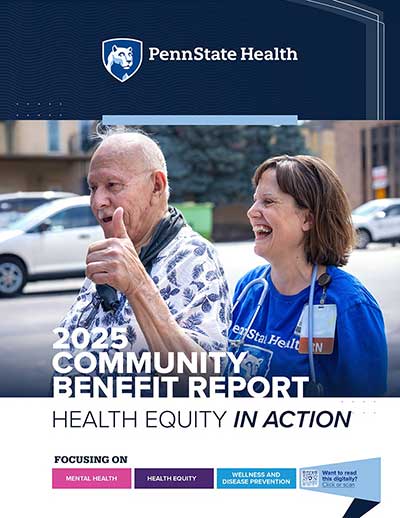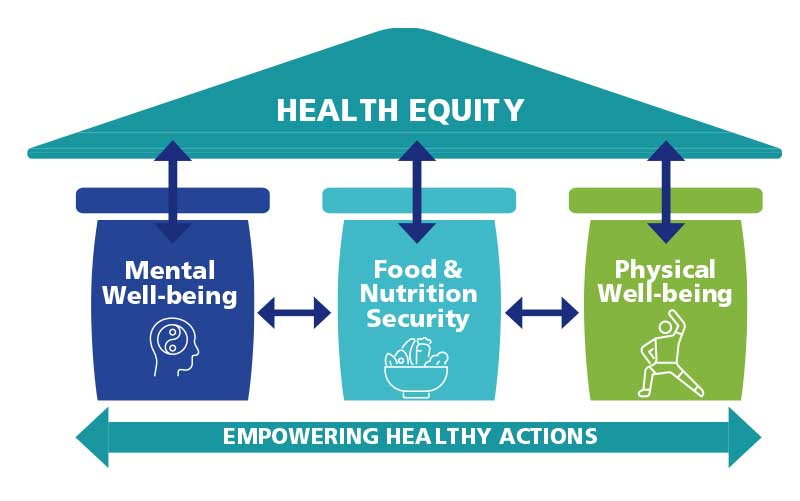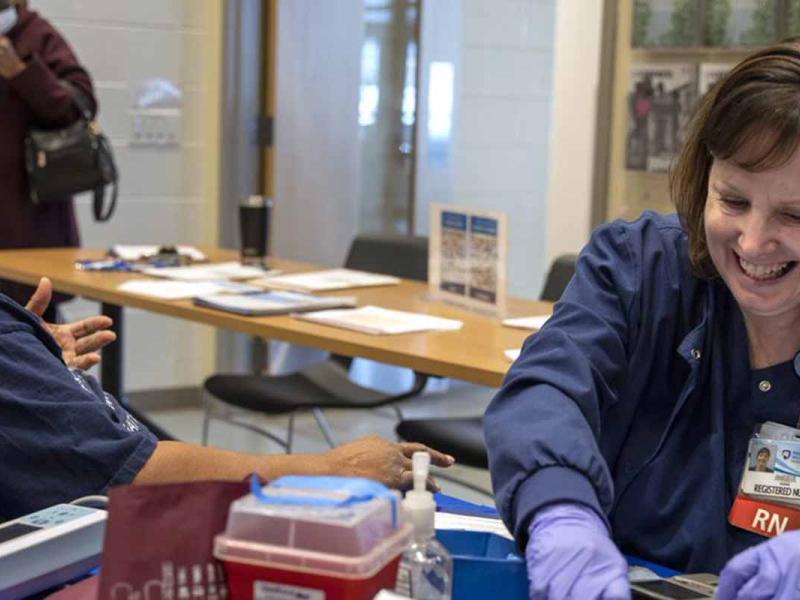
2025 Community Benefit Report
Find out how Penn State Health is taking action to advance health equity.
Community Health Needs Assessment and Implementation Strategy
2024 Community Health Needs Assessment
- Full Report (PDF) | Informe completo (PDF)
- Implementation Strategy 2025-2028 (PDF) | Estrategia de implementación 2025-2028 (PDF)
Fast facts:
- The Affordable Care Act requires tax-exempt hospitals to complete the Community Health Needs Assessment (CHNA) process every three years.
- The service area defined for purposes of the CHNA encompasses 225 ZIP codes in six Pennsylvania counties: Berks, Cumberland, Dauphin, Lancaster, Lebanon and Perry. These six focus counties represent the communities where health care resources are available and provided by the partnering PSH organizations. The counties are also home to 75% of Penn State Health’s patient population.
- We conducted a Key Informant Survey with 460 community leaders and stakeholders representing the broad interests of the community, including experts in public health and individuals representing medically underserved, low-income and minority populations. Out of 460 surveys, 450 were analyzed, and 10 were excluded because they did not represent any of our six counties. We also held 12 follow-up conversations with Key Informants who requested them when completing their survey
- 1,521 individuals completed a Community Survey, and 1,474 responses were eligible for use based on the participants’ county and age.
- Conducted an analysis of Penn State Health data sources, including Community Health Data.
- We analyzed existing secondary data sources, including public health statistics, demographics, social measures and health care utilization.
Our commitment to community health
Penn State Health (PSH) is committed to understanding and addressing the health needs of the communities it serves. To best do that, the health system conducted its 2024 Community Health Needs Assessment (CHNA).
For this fifth assessment cycle, PSH formed a collective workgroup that included all PSH hospital leaders, five CHNA Task Forces and the PSH Community Health Team, including key community stakeholders. They worked together to identify and address the needs of residents living in Berks, Cumberland, Dauphin, Lancaster, Lebanon and Perry counties. The Department of Public Health Sciences at Penn State College of Medicine coordinated CHNA efforts. By taking a systemwide and communitywide approach to data collection and community health planning, PSH will leverage system assets across the service area to address the most important health needs.
Prioritized community health needs
A CHNA Leadership Team representing all PSH hospitals met on a regular basis throughout the CHNA process. This group reviewed all findings, including survey results, Key Informant conversations, secondary data analysis, current plan accomplishments and available assets, to recommend the three top-priority health needs to focus on. The Leadership Team also presented these results and recommendations to the PSH Community Health Team and five active CHNA Task Forces. All these groups consist of community-minded positions from PSH entities as well as community partners. The prioritization criteria considered included the severity and magnitude of the need, contributing social issues, existing community partnerships and assets, what the community identified as important and needed, and a review of our current plan’s accomplishments. We also considered the expertise, resources and goals within each medical center and across PSH. Therefore, through multiple methods of community engagement and dialogue with community health experts, the top-prioritized health needs for systemwide health improvement efforts over the three-year cycle from July 1, 2025, to June 30, 2028, are:
- Mental well-being
- Food and Nutrition Security
- Physical Well-being
These efforts are aimed at empowering healthy actions to ultimately achieve health equity.

Implementation strategy
Partnering hospitals and community experts develop our three year Implementation Strategy to coordinate our collective impact to address these priorities. Our goal is to improve health and reduce health disparities across our six-county region.
Thank you
We thank all our community partners who joined us in these efforts. We look forward to continued partnership in strengthening our community together.
Additional information and feedback
Please contact us at [email protected]:
- If you have any questions, need accessibility accommodations, or would like to request a hard-copy version of any of our CHNA documents.
- For additional information about the CHNA and opportunities for collaboration.
Additional Documentation
2021 Community Health Needs Assessment
2018 Community Health Needs Assessment
- Full Report (PDF)
- Overview (PDF)
- Implementation Strategy (PDF)
- Report Card through FY20 (PDF)
- Report Card through FY21 (PDF)
- Report Card through FY22 (PDF) | Boleta de Calificaciones hasta el AF22 (PDF)
2015 Community Health Needs Assessment
- Full Report (PDF)
- Executive Summary (PDF)
- Implementation Strategy FY 2016-2019 (PDF)
- Report Card through FY17 (PDF)
- Report Card through FY18 (PDF)
- Report Card through FY19 (PDF)
2012 Community Health Needs Assessment
- Full Report (PDF)
- Executive Summary (PDF)
- Implementation Plan (PDF)
- Progress Report through FY 2015 (PDF)
Holy Spirit Medical Center Community Health Needs Assessment
Holy Spirit Medical Center joined Penn State Health on November 1, 2020. For more information regarding previous CHNAs, please contact [email protected].
St. Joseph Medical Center Community Health Needs Assessment
- Berks County Health Collaborative Community Health Needs Assessment – 2016 Final Summary Report (PDF)
- Penn State Health St. Joseph Community Health Needs Assessment Implementation Plan – 2016 (PDF)
- Berks County, Pennsylvania Community Health Needs Assessment – October 2012 (PDF)
- St. Joseph Regional Health Network Community Health Needs Assessment Implementation Plan – May 2013 (PDF)









